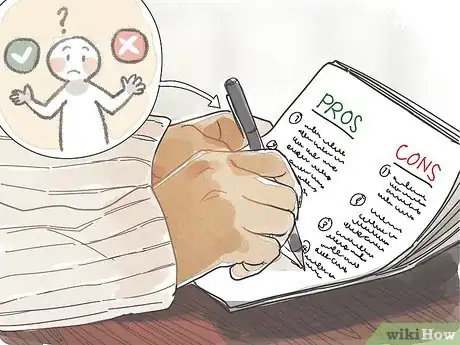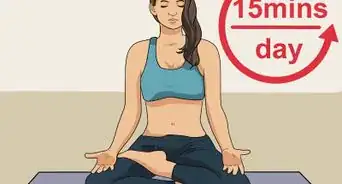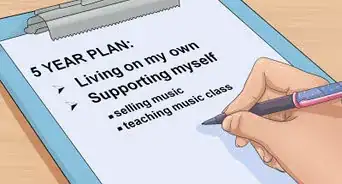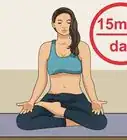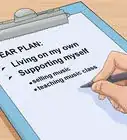This article was co-authored by Guy Reichard. Guy Reichard is an Executive Life Coach and the Founder of HeartRich Coaching & Training, a professional life coaching and inner leadership training provider based in Toronto, Ontario, Canada. He works with people to create more meaning, purpose, well-being, and fulfillment in their lives. Guy has over 10 years of personal growth coaching and resilience training experience, helping clients enhance and transform their inner worlds, so they can be a more positive and powerful influence on those they love and lead. He is an Adler Certified Professional Coach (ACPC), and is accredited by the International Coach Federation. He earned a BA in Psychology from York University in 1997 and a Master of Business Administration (MBA) from York University in 2000.
There are 7 references cited in this article, which can be found at the bottom of the page.
This article has been viewed 42,371 times.
Making a choice between two or more options can be a difficult and overwhelming experience. Especially if the decision will affect you in the long-term, you may wonder if you will make the right choice. And even smaller choices may leave you feeling anxious and doubtful. But you can make choices without regret if you evaluate your options and make your decision. Then, build confidence in yourself and accept the consequences of your choices.
Steps
Evaluating Your Options
-
1Make sure you are calm. It’s never a good idea to make a major decision when you are upset or stressed. Your emotions can cause you to make a choice that you regret.[1] So take a moment to make sure that you are calm and making a logical, rational decision.
- For example, you shouldn’t try to choose how to cut your hair when you just found out your partner is cheating on you.
- Take a few deep breaths and make sure that you are relaxed and calm when you make your decision.
- Ask yourself, “Am I calm enough to make a mature decision that isn’t based on anger, hurt, jealousy, or anything like that?”
-
2Define your values. A good decision is usually one that aligns with your personal values — this is a decision made with integrity. If you are unsure of what your values are, take some time to work this out before you make a decision.[2] [3]
- Think back to the times when you felt happiest. What were you doing? Who were you with (or were you alone)? What made you feel happy in that moment?
- Think about when you felt proud of yourself. Why were you proud? Did other people share in those feelings of pride? Who?
- Think about times you felt satisfied, content, and fulfilled. What need or desire was fulfilled? How and why did the experience give your life meaning? What were some of the other factors at play that gave you this feeling of satisfaction?
- Using the information you have gathered, identify commonalities (Were you always with a family member? Was your passion for singing always a factor?). Then try to identify 10 values and rank them from most important to least.
- Values may include faith, family, adventurousness, empathy, generosity, service, nature, achievement, and more.
- Once you have identified your values, ask yourself if your decisions align with your values. Would taking a new job in a foreign country violate your top value of spending time with family? Would skipping class support or violate your top values of accountability and achievement?
Advertisement -
3Find out as much as you can about the situation. Learning as much as you can about your current situation and looking at all the interrelated factors can help you make a decision. Gathering all the available information can help you eliminate as many unknowns as possible and make the best choice with the information you have.
- Think about the impact your choice will have. You may find yourself in complex situations in which your decision will have a far-reaching impact.
- Try asking "So what?" With each fact you uncover, ask yourself this question. What is important about that fact? What are the implications?[4] For instance, if you determine that choosing to go to art school instead of business school will anger your father, ask yourself "So what?" to determine the implications. Maybe your father won't help you financially if you go to art school. "So what?" You don't have enough money to pay for school on your own. "So what?" You will need to come up with a plan to get student loans and a summer job to help pay for your education... and so on.
-
4List your options. You can make choices without regret if you take the time to think about all of your options before deciding on the one that you think is right for you.[5] Don’t just think in terms of "yes/no" or in terms of "either/or." Try to explore all of your possible options — even the less obvious ones — before making your choice.
- For example, you might think to yourself, “I could skip all of class and go to the mall, or I could skip part of class and just grab lunch, or I can stay at school.”
- If you can, write your options down, so that you can actually see them next to each other and possibly come up with more.
-
5Think about the risks involved. Try to think of the risks involved with each choice. There is no way to truly know what the outcome will be when you make a choice, but thinking through each risk and its probability can help you determine whether or not you want to go through with something.
- Ask yourself what is at stake. Try doing a risk analysis in which you ask yourself if there are any threats you might face, such as safety (illness, injury); interpersonal (harm to your reputation, loss of confidence from others, loss of friends); natural (weather, natural disasters, disease); financial (business failure, loss of income, loss of funding); and so on. Then consider the likelihood of any of these things happening and what the impact would be.
- Remember that a risk of any decision made can be regret. Factor that into your decision making — "If I don't take this chance, will I regret it in the future?"
- Be sure to think beyond the obvious outcomes. The choices you make will have some obvious consequences, but there may be other factors that aren't so clear.
- Let's say you've been planning a weekend sailing trip for several weeks, but now the weather is turning and you're not sure whether or not to go. What are potential consequences if you go? If you don't go? You might be putting yourself, your ship, and your friends in harm's way if you go. If you don't go, you might disappoint your friends, or the weather might be fine and it will turn out you could have gone. Weigh these risks and consider their likelihood.
-
6Write down the pros and cons of each option. Think about the best that could happen if you make that choice and the worst that could happen.[6] Be honest and realistic with yourself when writing down the positives and negatives of each possible choice. Don’t exaggerate the negative or inflate the positive.
- For example, instead of writing “my social life will end” as a downside to not attending a party, you could write, “I could miss out on a good time.”
- Or, for instance, you could write, “We could have a great time” as a positive to going out with someone new, instead of, “We could fall in love.”
Making Your Decision
-
1Seek advice with caution. Sometimes it can be a good idea to ask someone else what they would choose if they were in your situation. You should keep in mind, however, that everyone has a different perspective based on their personal experiences. What is a good choice for someone else may not be a good choice for you. So, be careful when taking advice from others when you are trying to make a choice you won’t regret.[7]
- When you do ask for advice, ask people that you trust. You’ll feel more confident if you are turning to someone who generally makes good choices.
- Try to ask someone with experience in the area. For instance, if you’re deciding on the plants for your home, you might ask your uncle, the landscaper, for advice.
- Ask why they would make that decision. For example, you could ask your uncle, “Why would you choose that plant over the other one for this spot?”
-
2Give yourself time to decide. It’s generally not a good idea to make a major decision, especially one that could have long-term consequences, in a hurry.[8] So, slow down, give yourself time to think through your choices and their consequences before you make a decision.
- If it is a major decision that could affect you for a long time afterwards, you should take at least 24 hours to think about your choices, if not more.
- For example, choices about sex, parenting, your health, and finances are decisions should be made slowly with a lot of thought about possible consequences.
- Don’t allow anyone to pressure you into making a quick decision, especially about things that can impact you in the long-term.
-
3Determine which choice will be best for you. Now that you have explored all of your options, as well as their possible consequences, you can decide what choice you should make. Think about which choice is consistent with your values and has the greatest benefits and the least negative consequences.[9]
- For example, you might think about whether getting suspended for skipping is worth an hour at the mall spending money that you need to save anyway.
- One of your top values may be academic achievement, and skipping class and possibly hurting your grade does not support that value.
- Then, you might decide that staying in school will be the best choice because you won’t get in trouble, your grades won't suffer, and you’ll save money like you need to.
Building Confidence in Yourself
-
1Use positive self-talk. Remind yourself that you can make good choices without regretting your decisions. Tell yourself that you have faith in your ability to make decisions and to live with the consequences of your decisions.[10]
- Look in the mirror and say to yourself, “I can make choices without regret. I trust myself to make decisions.”
- Write, “I believe in myself and my decision-making” on a sticky note and place it in your wallet or somewhere else you can see it often and easily.
-
2Keep a list of your decisions. Taking note and giving yourself a little pat on the back when you make the right choice is okay. Keeping a list can also help you see that you have recovered from not so great decisions, as well. Looking over the list can help you have confidence in yourself and make choices without regret.
- Write it down in your journal whenever you make a major decision.
- Write about how you made your choice and what factors influenced your decision.
- Later, go back and write about whether the decision was a good one or not.
- Write about how you felt about the decision and how you handled the consequences.
-
3Surround yourself with people that care about you. Spending time with people you respect and who care about you can boost your self-esteem. They can remind you of all the things that you have done right and will do right in the future.
- Spend time with family and friends that support you and encourage you. You can just hang out or do something like a take a walk or catch a movie.
- Talk to them about what helps them make choices without regret. For example, you could ask, “How do you make decisions without regret?”
- Ask them what characteristics you have that can help you make good decisions. You might say, “What do you see in me that can help me make good choices?”
-
4Keep yourself healthy. You will be able to make choices without regret much easier if your mind isn’t tired and confused because of lack of sleep or nutrition.[11] Make sure you are taking care of yourself so that you when you make decisions you will know that you made them with a sound mind.
- Get enough sleep. Try to go to bed at the same time each night and give yourself enough time to rest. Do something to relax before you get ready for bed.
- Eat meals that are nutritious and snacks that energize you. For example, you might have proteins, like grilled chicken, and fresh fruits and vegetables. Avoid junk food and overly-processed foods that lack nutrients.
- Try to get regular physical activity. This will help energize your body and focus your brain — which will help you make decisions you can trust.
Accepting the Consequences of Your Choices
-
1Congratulate yourself on a good decision. It doesn’t need to be a full-blown celebration, but give yourself a mental pat on the back when a choice you make turns out to be a good one. When you acknowledge your successful decisions, it eliminates your future self-doubt.
- Say to yourself, “Good job! I made a great decision this time!”
- Or you might think to yourself, “I did a good job thinking this decision through. I’m glad that I weighed my options and their consequences and didn’t rush myself!”
-
2Learn from your mistakes. Sometimes the choice you make doesn’t turn out to be the best decision. Even when you evaluate your options, you have to remember that things don’t always go as planned. When your decision ends up being a bad one, don’t fill yourself with regret and beat yourself up. Instead, try to learn something from the situation.[12]
- Ask yourself how this experience can help you in the future. What did you learn about yourself, other people, or life in general?
- Remind yourself that you can’t control everything and that sometimes what seems like a good decision may not actually be one.
- For example, if you chose to take a shortcut and ended up taking an hour longer to get home, you might think, “I can’t control traffic, so I’m not going to beat myself up.”
-
3Apologize and make amends when you need to. If you make a choice that ends up causing problems for someone else, the best thing to do is make amends. If you thought about the consequences for your options and didn’t think your choice would hurt anyone, then you don’t have to regret it. Instead, sincerely apologize and do what you can to make the situation better.
- Remind yourself that you never intended to cause any harm. You might say to yourself, “I wasn’t trying to cause problems for anyone with my choice.”
- Apologize to anyone that you have hurt or offended. Let them know that you are sorry that your choice caused problems for them.
- For example, you might say, “I’m sorry this happened. I never thought my decision would result in something bad like this happening.”
Expert Q&A
-
QuestionWhy is it important to make the right choices in life?
 Guy ReichardGuy Reichard is an Executive Life Coach and the Founder of HeartRich Coaching & Training, a professional life coaching and inner leadership training provider based in Toronto, Ontario, Canada. He works with people to create more meaning, purpose, well-being, and fulfillment in their lives. Guy has over 10 years of personal growth coaching and resilience training experience, helping clients enhance and transform their inner worlds, so they can be a more positive and powerful influence on those they love and lead. He is an Adler Certified Professional Coach (ACPC), and is accredited by the International Coach Federation. He earned a BA in Psychology from York University in 1997 and a Master of Business Administration (MBA) from York University in 2000.
Guy ReichardGuy Reichard is an Executive Life Coach and the Founder of HeartRich Coaching & Training, a professional life coaching and inner leadership training provider based in Toronto, Ontario, Canada. He works with people to create more meaning, purpose, well-being, and fulfillment in their lives. Guy has over 10 years of personal growth coaching and resilience training experience, helping clients enhance and transform their inner worlds, so they can be a more positive and powerful influence on those they love and lead. He is an Adler Certified Professional Coach (ACPC), and is accredited by the International Coach Federation. He earned a BA in Psychology from York University in 1997 and a Master of Business Administration (MBA) from York University in 2000.
Executive Life Coach You want the sum of your life's choices to reflect your guiding values and beliefs. If your decisions don't, then what's it all for in the end? You want to honor the things that you believe.
You want the sum of your life's choices to reflect your guiding values and beliefs. If your decisions don't, then what's it all for in the end? You want to honor the things that you believe.
References
- ↑ http://www.psychologicalscience.org/index.php/uncategorized/under-pressure-stress-and-decision-making.html
- ↑ https://www.mindtools.com/pages/article/newTED_85.htm
- ↑ Guy Reichard. Executive Life Coach. Expert Interview. 19 March 2020.
- ↑ https://www.mindtools.com/pages/article/newTMC_01.htm
- ↑ http://www.forbes.com/sites/mikemyatt/2012/03/28/6-tips-for-making-better-decisions/#7841d6c49f54
- ↑ http://www.webmd.com/women/tc/making-wise-health-decisions-skills-for-making-wise-health-decisions
- ↑ https://www.entrepreneur.com/article/218164
- ↑ http://www.webmd.com/women/tc/making-wise-health-decisions-skills-for-making-wise-health-decisions
- ↑ Guy Reichard. Executive Life Coach. Expert Interview. 19 March 2020.
- ↑ Guy Reichard. Executive Life Coach. Expert Interview. 19 March 2020.
- ↑ http://www.psychologicalscience.org/index.php/uncategorized/under-pressure-stress-and-decision-making.html
- ↑ Guy Reichard. Executive Life Coach. Expert Interview. 19 March 2020.



